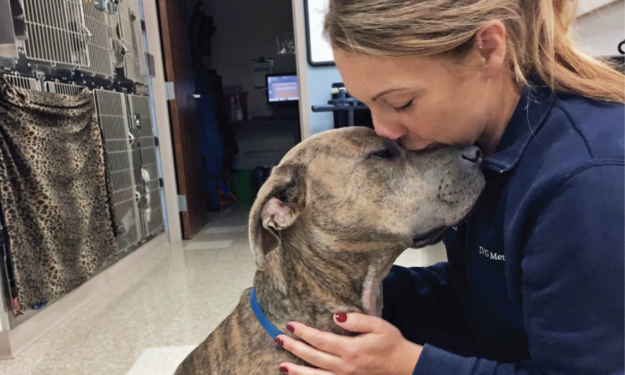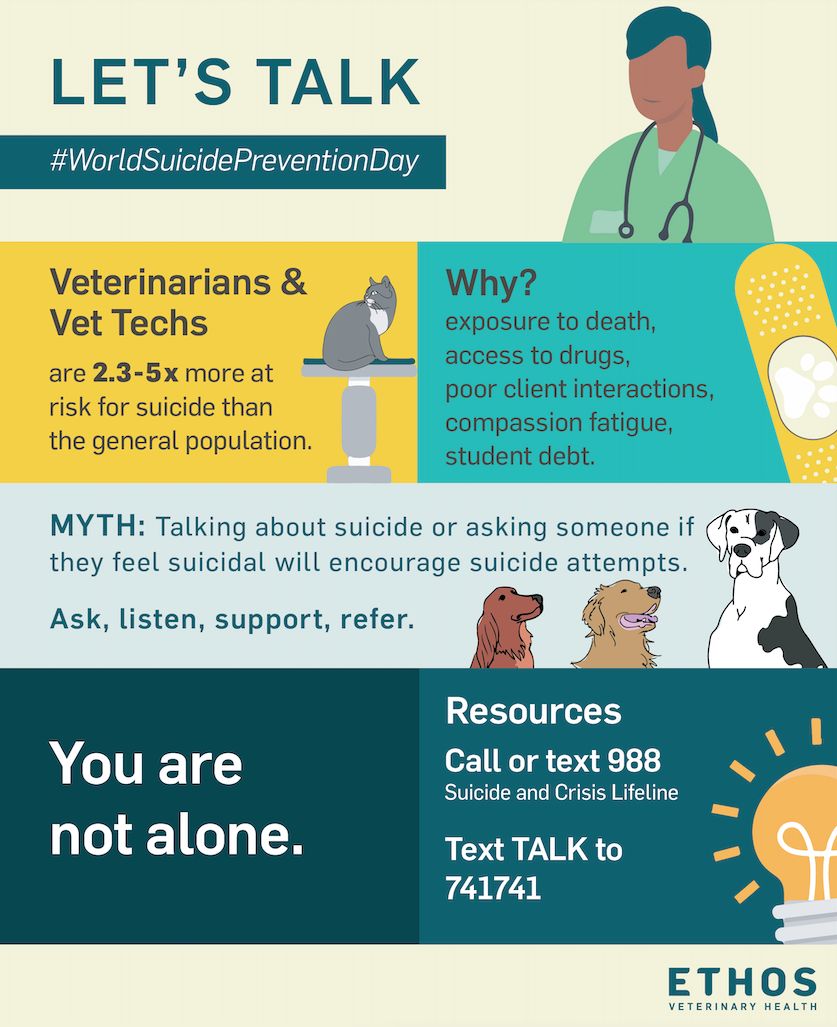Mental Health in Veterinary Medicine

Whether you work in the field or are a pet owner, it’s important to recognize the impact the veterinary field may have on your mental health. As the veterinary social worker at Massachusetts Veterinary Referral Hospital, it’s my job to be attuned to the human needs we might encounter on a daily basis. The more we talk about mental health in the veterinary field, the more we can break down the stigma associated with it.
When Caring Hurts: Mental Health & Veterinary Professionals
Let’s look at mental health among veterinary professionals: in 2018, Merck released a study that took a closer look at mental health and well-being among veterinarians in the U.S. They found that veterinarians had scored lower in well-being than the general population, and 80% of veterinarians experienced depression, compassion fatigue, or burnout, or anxiety or panic attacks within the past year.
There are many factors that contribute to high stress levels in the veterinary field:
- high levels of student debt (sometimes upwards of $400,000)
- long hours
- poor work-life balance
- death of patients
Death of patients is a very important factor to consider, as is the frequency that veterinarians and support staff encounter death. Studies have revealed that veterinary professionals encounter death 5x more than staff in human medicine. We need to keep the discussion of mental health in the veterinary field open to break down the stigma of asking for help. We also need to consider how these factors impact all staff members working in veterinary medicine.

The Impact of Pets: Mental Health & Pet Owners
As a pet owner, there are many ways the veterinary world might impact your mental health. Some of the biggest factors include:
- having a pet with chronic needs
- making end-of-life decisions
- the impact euthanasia might have on your or your family
Pets With Chronic Needs
Having a pet with chronic needs is difficult! Your schedule and your world might revolve around your pet’s needs or when they take their medications. The financial burden pet owners might feel can be incredible stressing. Sometimes we can make ends meet; other times, we might feel guilty because we cannot afford what our pets need.
End of Life Decisions & Euthanasia
Making end-of-life decisions for your pet can be devastating and emotionally draining. In addition, feelings of guilt or trauma might follow the decision to euthanize.
These are all significant events that can cause distress to pet owners and impact overall well-being. When experiencing a distressing event, pet owners should talk about how they’re feeling and seek professional help when they need it.
The Paw-sitive Side: How Pets Improve Mental Health
The human-animal bond can also have a very positive effect on mental health. According to Mental Health America, pets and therapy animals can help alleviate stress, anxiety, depression, feelings of loneliness, and social isolation.
Interactions with animals can also help people manage long-term mental health conditions. If you don’t have a pet, try volunteering at a local shelter or coordinating therapy dogs to visit your workplace. USC Southern California agrees, “employers and employees are discovering that pets at the workplace make them happier, lower their stress levels, and create a comfortable, flexible environment. Pets remind people to pause and step back from whatever they are involved in.” Taking breaks with animals in the workplace has been proven to increase productivity.
Animals can also benefit older adults who live in nursing or assisted living facilities. Many patients within nursing homes have experienced a special relationship with a pet in their lifetime but are no longer able to have an animal companion. Companionship is a well-known benefit of therapy animals, but therapy visits may also help with anxiety and depression. These visits can spread feelings of love, happiness, and positivity and in turn, might reduce irritability, frustration, and sadness. The benefits of animals on our psychological health has been known for a while. Even Sigmund Freud would have his dog in therapy sessions with some of his clients!
Any pet owner knows the unconditional love experienced from the human-animal bond can have a positive impact on our well-being and mental health. It’s important to acknowledge the impact animals, and the veterinary field can have on mental health.
So, whether you work in the field or you identify as a pet owner, take a moment on World Mental Health Day to consider how it might impact your mental health too.
Additional Resources:
https://appliedpsychologydegree.usc.edu/blog/the-benefits-of-bringing-pets-to-work/
https://avmajournals.avma.org/doi/pdf/10.2460/javma.252.10.1231
https://www.mhanational.org/blog/better-mental-health-experience-pet-effect
Written by: Christina Stephens-Malloy, LCSW